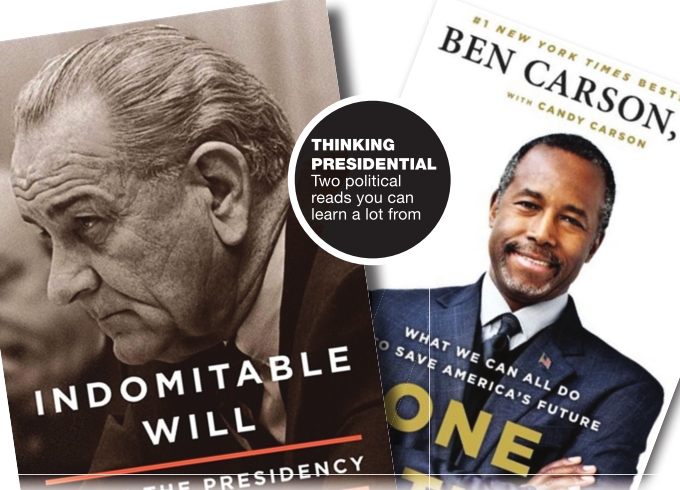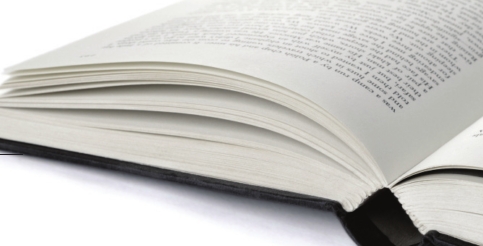
A study in contrast, LBJ and Dr. Ben Carson
“Idonmitable Will”
by Mark Updegrove
Being a strong Republican, I’m surprised how much I liked this book. It was required reading in a friend’s emerging leader’s conference so I borrowed it, and I had interest after attending a seminar on Lee Harvey Oswald that brought up Democratic President Lyndon Johnson quite a bit. The book made me realize how many decisions a president makes in a day.
Johnson used Kennedy’s martyrdom to his advantage in ways that he could. They were quite different. He was from Texas and not a smooth, refined Kennedy from the Eastern establishment. Wife Lady Bird was from nearby Karnack, where she enjoyed the East Texas woods, therefore, her beautification platform. On their second date he wanted to marry her. Her ring was $2.50 from Sears, and she kept it to make sure the marriage would last. She wanted her husband to need her. Her daughter said she never cried, that if she did, she would never stop. Jackie Kennedy was a hard act for her to follow.
Why you would recommend this book: I’d recommend it if you are thinking about running for political office, which I’ve considered. Johnson’s 10 principles in politics are loyalty 10 times.
Ben Barnes, speaker of the House, said Johnson once told him to think of 100 people who had helped him most in his life and make them his home base. Remember their birthdays, children’s names, attend weddings and anniversaries. Be there when they bury their dead. There isn’t anyone more important than those who “brung you” first. When you value your friends, you build trust.
Johnson knew human nature; he picked up on people’s
frailties. He did not know the world like Ike Eisenhower or read 10
books a week like Kennedy. Kennedy liked foreign affairs, but LBJ
understood Washington, could persuade people and understood the workings
of men. He was not interested in the world outside of the United
States. He wasn’t exposed to it as much.
Lasting
impressions: Johnson was informed on information in congressmen’s home
districts, what issues were near and dear to their heart and would
mention it. He studied how people acted, sized them up. He knew their
temperament and the best time of day to negotiate with them.
He was a master of human relations.
He
could woo people. He would establish a target and be focused on that
objective, and then there would be another one. He had clippings,
mementoes, statistics. He did a lot of “you scratch my back, I’ll
scratch yours.”
The TV
medium evaded Johnson. He was better in meetings. He liked to keep his
speeches short. He was obsessed with the news and the Associated Press.
He gave out busts of himself to heads of state and the pope, later pictures of the moon.
He
asked his staff not to get him into something until they knew how to
get him out. He helped a lot of his staff get jobs when he quit.
And the last interesting tidbit, when born, he did not have a name for three months.
In
the interest of equal time for a Republican, this is what I learned
from Dr. Ben Carson’s book, “One Nation: What We Can All Do to Save
America’s Future.”
If
you prepare yourself well educationally (first 20 years of your life),
you have 60 years to reap the benefits. If you prepare poorly, you will
have 60 years to suffer the consequences. It makes sense that he says
this is what citizens should know: basic world and American history,
basic world and American geography, basic household economics, how
credit works and debt accumulates, names of state and national
representatives, basic
nutrition and disease management, traffic rules, basic math and the
ability to read at an eighth-grade level.
Carson’s mother got married at 13. She was one of 24 children. Her husband was a bigamist. She had a third-grade education.
Reading saved Carson. She demanded it.
He
learned something from every job he had. He was a lab assistant setting
up experiments; payroll clerk, learning office machines; bank teller,
focusing on accuracy; mailroom clerk, which taught filing; encyclopedia
salesman, learning about presentation; supervisor for a highway cleanup
crew, learning to motivate people and the importance of teamwork;
assembly line worker providing concentration; student aid to Yale campus
police led to knowledge of security; X-ray tech, learning to operate
equipment that he eventually used in the operating room; crane operator
teaching coordination; and bus driver, learning to be cautious. Think
about this in your life, especially if you are just starting your
career.
What are you reading next: “The Power of Habit: Why We Do What We Do in Life and Business.”
This is not an endorsement of any candidate.
Mary
Ann Van Osdell has written for numerous publications and has been a
long time contributor to both The Forum News and CityLife Magazine. Van
Osdell has won numerous awards for her reporting. She has a B.A. in
Journalism from LSU in Baton Rouge and currently serves as legislative
assistant to Senator Barrow Peacock.
READ ON: Each month CityLife will feature a book review from a local voice in the community.
If you would like to share a favorite book, e-mail [email protected].